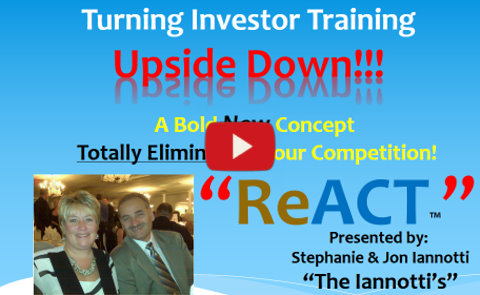Tampa Real Estate Investors Alliance Blog
Presenting Offers – Part 2
Posted on March 10, 2014 byOkay, now we are out at the house. Next step is to ask the seller if you can take a quick look around, and do just that. I don’t spend more than three minutes walking through the house, taking a look at it. Please do not make any comments if you see anything wrong with the house. You’re not there to downgrade the house. You’re there to either buy it or lease option it, and you don’t do that by upsetting the seller. I’m sure that most sellers are clearly aware that their walls need painted or whatever you see, they can see as well.
Once you’ve looked around, the next step is to ask them if they have any questions. You’d be surprised what happens when you let them do the talking and you not doing the seminaring. Simply ask them if they have any questions. If they do, answer them shortly, to the point, but simply enough so that anyone can understand them.
If they don’t, then the worst thing you can do is start rambling off at the mouth and create questions by trying to deliver a real estate seminar. If they don’t have the questions, don’t answer the questions. If they have the questions, answer the questions. Read More→
Work Smart – Play Hard
Posted on March 10, 2014 byI got into the real estate investing business to have more free time for myself and my family and to have the financial freedom to do whatever I wanted, whenever I wanted. I wanted my life to be more worry free. I have spent a great deal of time accomplishing that goal and I want to share some of my insights with you as a real estate entrepreneur.
When you decide to become a Real Estate Investor, make sure you structure your business in such a way that it doesn’t become overwhelming, even more so than a full time job could be. It’s very easy to fall into that trap, especially if you work from home. You can also fall into the trap of trying to do everything yourself, and long-term, this just won’t work. Believe me when I tell you that most tasks in your business need to be delegated to others starting with your marketing.
In my particular case I like to work from home and most of the functions of our business are handled off sight and by Independent Contractors. One of the ways I solved the problem of getting overwhelmed with work was to determine what hours per day would be dedicated to my real estate investing business. At the end of the day the door to the office gets closed and the phones go to an answering service. Your family will appreciate you for this as well. Read More→
New Tricks for Old Dogs – Investing in Education
Posted on March 10, 2014 by“I accidentally forgot to graduate from college.” ~ Anne Lamott
Last week my Aunt Blanche came to dinner and told us all about a class she was taking: Financial Markets, at Yale. Really? THE Yale? Blanche is pretty imaginative, so I thought she was making it up. Sure enough, though, she proved it: She’s got a certificate in Financial Markets from Yale University. I have to admit I was impressed. It had to have taken work and dedication, and, I imagined, lots of money, too.
That got me thinking about how important it is to invest in ourselves, particularly in our own education. So many of us think we don’t have the time or money to spend on ourselves. We feel overwhelmed just facing the details and expenses of daily life. In my experience, though, learning something new gives me new energy and motivation to spend on all the mundane stuff.
Maybe you’d like to invest in yourself, but someone else has told you it’s just silly. That sounds like a naysayer to me, so let’s talk about naysayers for a minute. You know who they are: the folks who tell you it’s dumb to spend 15 weeks on a college course. The ones who say you’re too old, you’re too busy, you’re not smart enough. There’s a naysayer in every family. And too often, the worst naysayer of all is YOU. Read More→
Real Estate Investor or Business Owner? Do You Know The Difference?
Posted on March 10, 2014 byAre you sitting on a ton of cash and you are not sure what to do with it? Do you need to find a real estate investment to put all that cash into? Are you struggling to find a deal that will give you a good ROI on all that cash you have laying around? Or does this describe you…?
Do you need to find some cash to do your real estate deals? Are you trying to figure out how to get your deals funded? Are you looking for partners to help with the cash to get started or perhaps you are looking for a “no money down” deal to get you going?
If the second description is you then you are not a real estate investor…you are a real estate entrepreneur! You are a real estate business owner, not an investor and there is a BIG difference. An investor is someone that fits the first description. An investor already has a lot of cash and needs to put it into a deal to get a return on all that money they have laying around.
Most people don’t realize that they are real estate entrepreneurs and are not actually real estate investors at all. This is one major mistake that most new real estate entrepreneurs / investors make and it can definitely lead to early failure in the real estate business. Read More→
REACT Workshop – March 15, 2014
Posted on March 9, 2014 byTampa REIA Presents:
The REACT Workshop
A Full Day Workshop with Jon & Stephanie Iannotti
On March 15th from 8:30AM – 5PM
at the Doubletree Suites Tampa Bay
 Is REACT Worth Your Time and Effort? OK, so if you have no competition, unlimited leads, and qualified, cash, and credit challenged buyers with money down, how can you lose?
Is REACT Worth Your Time and Effort? OK, so if you have no competition, unlimited leads, and qualified, cash, and credit challenged buyers with money down, how can you lose?
If you made just $5,000 per deal and did one deal per month, would that change your life?
What if you did one deal per week?
4 Deals x $5,000 = $20,000!
What if you made an average of $10,000/Deal?
4 Deals x $10,000 = $40,000!
I think you can see where we are going with this. We know of one person we coached that is doing 3-4 Deals per week with an average of $12,500 per Deal!
Back in 2007 when the Real Estate market was crashing is when this and another concept called “ACTS” was created by Steph and I. We had to find something that worked. So these techniques were born out of necessity.
None of the techniques we had been taught and used for years were working. They all dried up overnight. So we went back to basics… options, lease/options with a new twist.
The beauty of REACT is that it will work in a down market, an up market, and a sideways market. REACT works with no money, no credit. Motivated Sellers are an option, not a necessity… Think about that one! So, if you want an unlimited supply of leads, where every one of them WANTS to sell, you do not want to miss this Workshop.
REACT is the latest and greatest technique to hit Real Estate Investing in decades. Now we will tell you this, you have to be taught and you have to do it correctly. This is why you have to come to the workshop and get this training.
Once you learn REACT, you can take the housing market by storm. Together we can correct the down turn that the government can’t.
It’s time to REACT!!!!
See you at the Event!
Jon & Stephanie Iannotti
“The Iannotti’s”, The Cruise Control Couple
Learn How to REACT with the Iannotti’s at Tampa REIA on March 13, 2014
Posted on March 3, 2014 byat the Doubletree Suites Tampa Bay
A Bold New Concept Called “REACT” That Will Totally Eliminate Your Competition!
Tampa REIA Members Can Attend at No Charge & Guests for $10.
RSVP Online Now to Attend the Meeting.
 Tampa REIA is excited to announce that Jon & Stephanie Iannotti will be our special guest trainers this month on Thursday, March 13th at 6PM at the Doubletree Suites Tampa Bay located at 3050 North Rocky Point Dr West in Tampa, FL. The Iannotti’s, who are the creators of “ACT” (Assignment of Contract and Terms), are turning real estate investor training upside down with a bold new strategy they call “REACT”.
Tampa REIA is excited to announce that Jon & Stephanie Iannotti will be our special guest trainers this month on Thursday, March 13th at 6PM at the Doubletree Suites Tampa Bay located at 3050 North Rocky Point Dr West in Tampa, FL. The Iannotti’s, who are the creators of “ACT” (Assignment of Contract and Terms), are turning real estate investor training upside down with a bold new strategy they call “REACT”.
- What is REACT?
- How to make money with no Credit, Money or Contractors.
- How to do as many deals per month as you want.
- How to make minimum $5,000 per deal.
- Do you need a License to do this?
- How to get the benefits of ownership without owning.
- How to put it all on ‘Cruise Control’.
 WIN A CRUISE: All participants who attend the Tampa REIA Meeting will entered into a drawing for a chance to win a *Complimentary 2 Day Cruise to the Bahamas with Caribbean Cruise Line! *You must be present at the meeting to win. The 2 day Cruise does not include port fees, transportation and taxes.
WIN A CRUISE: All participants who attend the Tampa REIA Meeting will entered into a drawing for a chance to win a *Complimentary 2 Day Cruise to the Bahamas with Caribbean Cruise Line! *You must be present at the meeting to win. The 2 day Cruise does not include port fees, transportation and taxes.
*Please Note: Meeting agenda is subject to change.
 After the conclusion of the Tampa REIA Main Meeting (around 9:30PM), we will be reconvening at Whiskey Joe’s Bar & Grill located at 7720 West Courtney Campbell Causeway in Tampa for the “Meeting after the Meeting”. Come eat, drink, network and have fun with us as hang out late into the night on Tampa Bay!
After the conclusion of the Tampa REIA Main Meeting (around 9:30PM), we will be reconvening at Whiskey Joe’s Bar & Grill located at 7720 West Courtney Campbell Causeway in Tampa for the “Meeting after the Meeting”. Come eat, drink, network and have fun with us as hang out late into the night on Tampa Bay!
Jon & Stephanie Iannotti
Posted on February 28, 2014 by Jon & Stephanie Iannotti are Amazon #1 Best Selling Authors of “The New Masters of Real Estate, Getting Deals Done in the New Economy.” 12 of the 18 contributing authors were mentored or coached by them personally. They are also National Speakers and National & International Mentors to well over 250 students over the past few years.
Jon & Stephanie Iannotti are Amazon #1 Best Selling Authors of “The New Masters of Real Estate, Getting Deals Done in the New Economy.” 12 of the 18 contributing authors were mentored or coached by them personally. They are also National Speakers and National & International Mentors to well over 250 students over the past few years.
With over 30 years combined experience in Real Estate Investing/Teaching, and Mentoring and over 1500 creative deals under their belts, they are considered one of the best in the industry. They have also come up with some amazing ways to structure deals that are cutting edge and they have done many deals with their student partners using these state of the art techniques which are now being taught across the country and internationally.
They have trained and worked with some of the biggest names in Real Estate Investing. To name a few, Ron LeGrand, Robin Thompson, Lee Phillips, Al Aiello, Ted Thomas, and many others. Read More→
The Profit February 2014 Edition
Posted on February 10, 2014 by The February 2014 edition of The Profit Newsletter is now available for download. You can download The Profit Newsletter as a High Quality PDF (Recommended) or Low Res PDF for slower devices. The Profit Newsletter is the official newsletter of the Tampa Real Estate Investors Alliance and is a digital, interactive newsletter for new and seasoned real estate investors delivered as an Adobe PDF file to read on your PC, Mac, Smart Phone, iPad or other mobile ready devices with a PDF reader. Many of the articles and ads in The Profit contain hyperlinks you can click or tap to visit websites, watch videos, listen to audios, download content, send emails, comment on articles, share socially and much more! The high res version of The Profit is “print ready” for those who want to print the newsletter on their home or business printer. Also, be sure to Subscribe to The Profit so you don’t miss a single monthly issue.
The February 2014 edition of The Profit Newsletter is now available for download. You can download The Profit Newsletter as a High Quality PDF (Recommended) or Low Res PDF for slower devices. The Profit Newsletter is the official newsletter of the Tampa Real Estate Investors Alliance and is a digital, interactive newsletter for new and seasoned real estate investors delivered as an Adobe PDF file to read on your PC, Mac, Smart Phone, iPad or other mobile ready devices with a PDF reader. Many of the articles and ads in The Profit contain hyperlinks you can click or tap to visit websites, watch videos, listen to audios, download content, send emails, comment on articles, share socially and much more! The high res version of The Profit is “print ready” for those who want to print the newsletter on their home or business printer. Also, be sure to Subscribe to The Profit so you don’t miss a single monthly issue.
Are You Going To Make It? Be Honest With Yourself
Posted on February 10, 2014 byYou want success, right? That’s essentially the purpose of any kind of training. However, It doesn’t matter how much “how to” you absorb, it will not cause the result you want – which is the achievement of a specific goal or milestone. How much action are you putting behind what you learn?
Let me say something to all of you out there trying to get traction in real estate investing and haven’t been able to do it yet. First I want to state the obvious, Don’t Give Up. But now I have to give you some cold, hard facts.
The only difference between the few successful people vs most other people out there is the amount of TV you watch.
I know that sounds funny, but it’s true.
9 out of 10 people WASTE the most valuable asset they have, which is time. You can’t ever get it back, and the minutes you’re taking to read this is an investment in your future. Time spent watching worthless TV is robbing you of your life.
Part of this mental preparation is understanding the disciplined principal that you can’t always give in to mental candy, which is what TV (and music) are. You have to lessen your donuts, i.e. the mental candy of TV and frivolous music or you can’t achieve anything. Read More→
What Marketing Methods Will You Use to Promote Your Business?
Posted on February 10, 2014 by Over the last two months we discussed Step #2 of “Determining Your Marketing Plan in 7 Easy Steps” which was to “Determine Your Market”. We broke Step #2 down into 2 parts which were to determine “Who and What is Your Market?” and “Where is Your Market Place?” This month we’re going to move along to Step #3 which is to “Determine Your Marketing Methods”.
Over the last two months we discussed Step #2 of “Determining Your Marketing Plan in 7 Easy Steps” which was to “Determine Your Market”. We broke Step #2 down into 2 parts which were to determine “Who and What is Your Market?” and “Where is Your Market Place?” This month we’re going to move along to Step #3 which is to “Determine Your Marketing Methods”.
Webster defines a “method” as a careful or organized plan that controls the way something is done. Coming up with an organized marketing plan is exactly what the 7 Steps are all about so we want to put some careful thought into the methods we will use to get our desired results.
In Step #1, you determined how many leads you need to achieve your personal and business financial goals. In Step #2, you determined who you want to market to and where you want to market.
In Step #3, you need to determine what marketing “methods” you will use to promote your real estate investing business to your desired prospects in your market area so you can generate your desired number of leads each and every week/month to reach your financial goals. Read More→
It’s Impossible to Run a “4” Minute Mile Before You Learn How to Walk!
Posted on February 10, 2014 byI recently had a telephone conversation with one of my students who asked me what I thought was going to be the next best strategy to use to do more deals in 2014. My student is thinking the market is making a real come back. He is very excited because he is seeing house prices starting to go up, house sales are increasing every month and he had just been told by a traveling Guru that the market has huge profit potential and the market is headed back to 2006 price levels just like it was before the crash.
I can truly appreciate his bright eyes and positive enthusiasm. This student is someone who spends time and money constantly in seminar land listening about the latest niche that will be the next million dollar method for investors to create wealth. I must admit that some of the most recent strategies being pitched could, if done using thorough research and use the correct paperwork could be profitable. My problem with all of these new strategies…. Most of these new strategies aren’t really new. Many have been around for years. The problem, many new investors quickly bore with each strategy as they hear about the next great money making idea that is making investors wealthy. Most of these new strategies will require large sums of money to learn and implement. As market conditions continually change another will soon appear and the investor is again quickly off in a different direction without perfecting the last. Read More→
Get Seller Financing
Posted on February 10, 2014 byBuying and rehabbing distressed properties can be a lucrative business but it can also be risky. Rehabbing and flipping often generates quick checks but may also take some upfront cash to get the deal done. Here are some tips for rehabbing property with seller financing so you keep more of that cash in your own pocket.
If a property is in need of repairs or it won’t cash flow at that price the seller is asking then you may have difficulty getting a bank loan for the deal. Get the seller to finance the deal. Create an offer that will give the seller the price they need but only if they will carry back the loan on the property in a first position mortgage.
If a seller will carry back the loan then you will likely need to pay the asking price or close to it. Your offer must create value for the seller. The majority of the time when a seller carries back a note on a property they are usually more concerned about the price they are getting than the terms of the loan. This can be in your favor. Create an offer that is close to or at full price but with an interest rate and terms that will allow for small payments and bigger cash flow. One example would be making a full price offer with interest only payments. The full amount of the loan would be due when you sell or refinance the property. The risk here is that you don’t pay down any of the loan amount but it would be much easier to cash flow. This works well if the market is appreciating quickly. You can cash flow the deal and then flip it in a few months for a big check. Read More→
Presenting Offers – Part 1
Posted on February 10, 2014 byIn our last article, we talked about Constructing Offers, so now we have to decide how to present them. The first step is to decide what your offer’s going to be. If you’ll remember, you can either lease option the property from the seller, you can buy it with owner financing, you can take it subject-to the underlying debt or sometimes you can pay all cash when you’re dealing with FSBOs.
You make this call by looking at the math on the property information worksheets as we discussed last month and deciding what your exit strategy is going to be. Are you going to stay in the deal or get out of the deal by flipping it on an ACTS?
Your next step, when you can get a YES on the property information sheets, is either: I will sell for what I owe, I will lease purchase, or I will consider monthly payments. Then it’s time for you to pick up the phone and call the seller to verify the facts you have are correct and to have a preliminary negotiation of what the seller has in mind. This is where scripts are very important, and you must get to the bottom line as to the seller’s true intent before you can make an appointment. Many people who are new in the business go ahead and make the appointment without being clear about whether the seller’s really motivated or not. And, even if they were sometimes, it’s not clear what we’re going to do when we get there even if the seller is motivated. So, before I go any further, let me back track just a hair. Read More→
Money Loves Speed
Posted on February 10, 2014 byDid the title of the article get your attention? I thought so. Money does love speed. Money in general loves speed. That means getting off your “you know what” and putting in to action whatever it is that needs to be done in your business (and in life). And the faster you do it, the more likely you are to be rewarded for it, financially. This will be one of my resolutions for this year – act with more Speed.
Let’s face it. You’re not getting any younger, the clock is always ticking. And, the sooner you realize the inherent value of speed, I promise you this; the more seriously you take your goals, the more urgency you will build into your daily habits.
Ever watched a commercial for some gadget or concept that you had thought of in the past and said “hey – that was my idea”? It may have been your idea and you should have acted on it. Instead, somebody else did and now they are billionaires. (Yep – I thought of Facebook too, but Mark Zuckerberg beat me to it).
But I’m not talking about just ideas. In general, things tend to work out better when you act on it faster. I don’t recall ever succeeding at something because I got there last.
Naturally, I’m going to relate this concept to Real Estate Investing, where Speed = Money. Because Money loves Speed. Read More→
Mobile Technology – It’s Not Just For Your Kids Anymore
Posted on February 10, 2014 byEvery once in a while, I like to take a close look at my business to make sure I’m still reaching my full income and personal potential. Hopefully, you do the same from time to time, because it takes diligence to maintain success for the long haul.
Students of mine know that if something isn’t working well, it means one of three things: their business is underfunded, underexposed, or undermanaged. This basic principle hasn’t changed since I started investing in real estate in 1997.
But how you meet that third requirement – adequate management – has changed a lot, because one of the keys to good management is the productive use of available technology. And boy, has technology changed since 1997!
Do you remember when a car phone was cutting edge, but it was a huge, expensive, ugly block of a thing with a foot-long antenna. There was no texting, and that phone sure didn’t take pictures, or save documents, or keep track of my appointments, or give me directions, or, well, do anything except make a phone call. And even though I was pretty tech-savvy, I was still very dependent on low-tech solutions like filing cabinets and calculators and old-fashioned film cameras. Read More→
A Step by Step Guide to How the Banks Committed Massive Fraud
Posted on February 10, 2014 byBy this time, most people are at least aware that mortgage banks were less than honest in how they created and sold mortgage backed securities over the last 15 years. It has driven a lot of negative sentiment towards the banks since the housing market crashed in late 2007, but very few people have a clear understanding of exactly what the banks did. That is completely understandable because the banks set up an extremely convoluted system of fake transactions specifically to avoid people catching on to what they were doing. In this article I am going to attempt to break it down into simple terms.
As the housing market heated up in the early 2000s, investors began to invest in what are known as mortgage backed securities. These are securities that consist of large pools of mortgages. The idea behind these investments was to capitalize on the housing boom while minimizing their risk.
In order to do this, investors had to work through brokers who compiled mortgages into securities on the investors’ behalf.
The way the investors would invest in these funds was use their money to fund a trust that would acquire mortgages either by originating them as the lender, or by purchasing existing mortgages. In a perfect world, the trust itself would then be the lender or purchaser designated on the mortgage. Read More→
Caution! Inaction Could Disinherit Your “Intended” Self-Directed IRA Beneficiaries
Posted on February 10, 2014 byNow that January is past, it’s time to settle in and think about some of the more important but often forgotten items. Chief among them is your beneficiary designations. The person or entity currently slated to inherit your Self-Directed IRA account may no longer be the person you want to inherit your account. This applies to your Self-Directed IRA, accounts under employer plans such as 401(k)s, 403(b)s, profit sharing plans, pension plans, and the many assets you have worked hard to acquire. There are numerous documented cases of individuals or estates inheriting retirement accounts and assets when the owner wanted the beneficiary to be a different party. The following tips can help you to track your beneficiaries and assets:
- Maintain a beneficiary file: Create a list of all of your retirement accounts/assets and identify the named beneficiaries. If you do not already maintain all of this information in one easily accessible area, now may be a good time to start. This will help you to keep track of both your current beneficiary designations and all of your assets.
- Perform annual check-ups: Check your beneficiary forms and your Will at least once per year to determine if you need to make any changes. Events involving your beneficiaries may necessitate changes to your current named beneficiaries. For instance, you may have gotten married or divorced, and need to update your beneficiary form to add or remove your spouse or former spouse. Read More→
Homeowner Associations Increase Short Sale Aggravations!
Posted on February 10, 2014 byWhen working with a Seller on purchasing a short sale it is very important to know the terms and conditions that the new buyer must uphold with the Homeowners Associations. Recently, we started working on a short sale wherein the Seller owed the Homeowner Association a fee of $457.00 per month and another Homeowner Association issue wherein they would only allow the Buyer to be an owner occupant. The Homeowner Association claims that the percentage of rentals have been filled and since that quota was met, this leaves only owner occupants eligible to purchase the property. Now your pool of buyers has been decreased greatly leaving only homeowners to buy the property.
The first thing you need to do when obtaining a short sale or any type of deal from a Seller, that you are interested in purchasing the property to fix and flip or just rent, is to obtain the Homeowner Associations Bylaws. There are Bylaws and Declarations that the Homeowners Associations are to provide to a new buyer. Here are some of the things you must look for to prevent any show-stoppers: Read More→
Profit From Shadow Inventory In 5 States
Posted on February 10, 2014 byWhen you know the best pockets or market areas around the U.S. to find discounted real estate, you are half way home. All that is left is evaluating the inventory for maximum profit. For those of you connected to REIAComps , the control and feeling of confidence you have over your deals is priceless. Using REIAComps to investigate the value of “Shadow Inventory” houses as they come to market, against the recent sold comparables, will provide you a solid position to “make your profit when you buy”.
First, let’s define “Shadow Inventory”. The general definition goes like this; the current stock of properties in the shadow inventory, also known as pending supply, by calculating the number of properties that are seriously delinquent, in foreclosure or held as REO by mortgage servicers, but not currently listed on multiple listing services MLS’s.
CoreLogic released its November National Foreclosure Report with a supplement featuring quarterly shadow inventory data as of October 2013. According to CoreLogic analysis there were 46,000 completed foreclosures in the United States in November 2013, down from 64,000 in November 2012, a year-over-year decrease of 29 percent. On a month-over-month basis, completed foreclosures decreased 8.3 percent, from 50,000 in October 2013. Read More→
Turn Your TRASH Into CASH – How to Make More Money by Selling The Leads You Get… Even if You Don’t Buy The House! – Part 2
Posted on February 10, 2014 byIn Part One of this Article, we discussed what most people do with leads, a typical wholesale deal, and a few reasons why you might NOT buy a house. And just when things were getting good & was about to reveal how to STILL make money even when you DON’T do the deal, I had to leave you hanging and make you wait until this part of the article came out to reveal the secret. Sorry about that. :)
But here’s where it gets interesting. So keep reading, won’t you?
Typically, if you can’t get a deal negotiated with a seller (usually because they don’t want to accept your low, wholesale price offer), you’d be stuck. You’d either throw the lead in the trash, or you’d ask them if it would be ok to call them back in a few weeks to see how things are going, then remind them of your offer to buy at your low price. Yeah, sometimes you’d get those offers accepted. Sometimes.
So what do you do if you still want to profit on this deal that you’ve already spent some time on?
Here’s your answer. Are you ready? Good… Read More→



